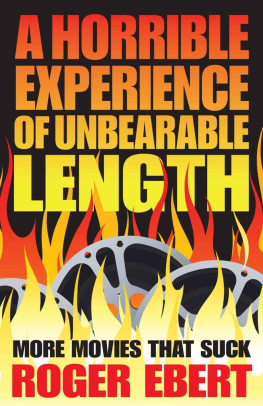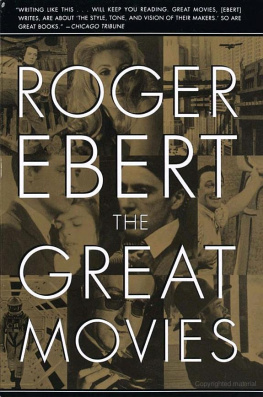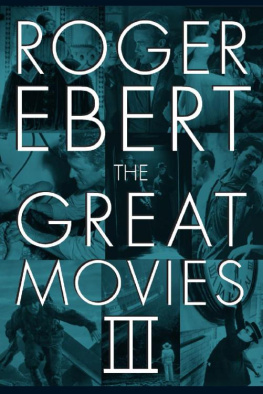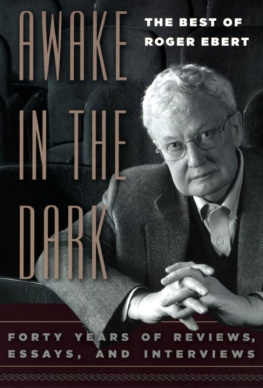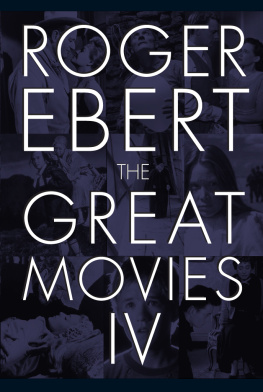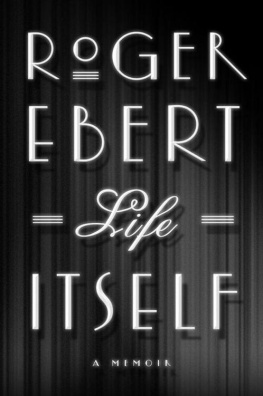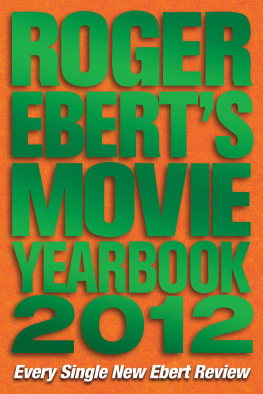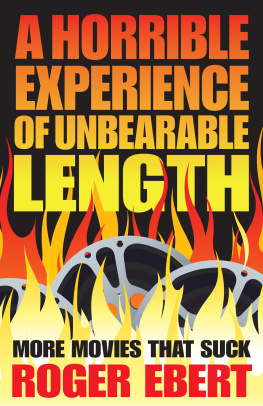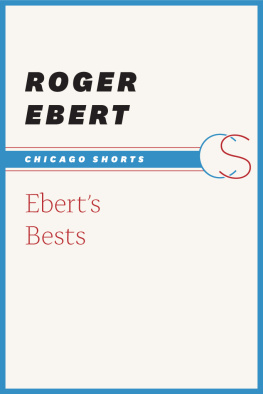
other books by roger ebert
An Illini Century: One Hundred Years of Campus Life
A Kiss Is Still a Kiss
Two Weeks in the Midday Sun: A Cannes Notebook
Behind the Phantoms Mask
Roger Eberts Little Movie Glossary
Roger Eberts Movie Home Companion (annually 19861993)
Roger Eberts Video Companion (annually 19941998)
Roger Eberts Movie Yearbook (annually 19992007, 20092012)
Questions for the Movie Answer Man
Roger Eberts Book of Film: From Tolstoy to Tarantino, the Finest Writing from a Century of Film
Eberts Bigger Little Movie Glossary
I Hated, Hated, Hated This Movie
The Great Movies
The Great Movies II
Your Movie Sucks
Roger Eberts Four-Star Reviews 19672007
Awake in the Dark: The Best of Roger Ebert
Scorsese by Ebert
Life Itself: A Memoir
with daniel curley
The Perfect London Walk
with gene siskel
The Future of the Movies: Interviews with Martin Scorsese, Steven Spielberg, and George Lucas
dvd commentary tracks
Beyond the Valley of the Dolls
Citizen Kane
Dark City
Casablanca
Crumb
Floating Weeds

A Horrible Experience of Unbearable Length copyright 2012 by Roger Ebert. All rights reserved. No part of this book may be used or reproduced in any manner whatsoever without written permission except in the case of reprints in the context of reviews.
Andrews McMeel Publishing, LLC
an Andrews McMeel Universal company
1130 Walnut Street, Kansas City, Missouri 64106
www.andrewsmcmeel.com
ISBN: 978-1-449-4-1756-7
Library of Congress Control Number: 2011932653
All the reviews in this book originally appeared in the Chicago Sun-Times.
Cover design by Tim Lynch
attention:schools and businesses
Andrews McMeel books are available at quantity discounts with bulk purchase for educational, business, or sales promotional use. For information, please e-mail the Andrews McMeel Publishing Special Sales Department:
dedication

This book is dedicated to Peter Sobczynski and his merry band of wisecrackers at the Lake Street Screening Room.
introduction

I received several messages from readers asking me why I felt it was even necessary for me to review The Human Centipede II (Full Sequence) . (There was also one telling me it should have been titled Human Centipede Number Two , but never mind that one.) My reply was that it was my duty. I feared it would attract large crowds to the box office, and as it turned out I was right. I did what I could to warn people away. Certain colleagues of mine discussed it as a work of art (however flawed). I would beg them to think really, really hard of another movie opening the same weekend that might possibly be better for the mental health of their readers.
It was not my duty to review many of the other movies in this book. I review most of the major releases during the year, but I also make it a point to review lots of indie films, documentaries, foreign films, and what we used to call art movies and might now call movies for grown-ups. If I had skipped a few of these titles, I dont believe my job would have been threatened. But I might have enjoyed it less.
After reviewing a truly good movie, the second most fun is viewing a truly bad one. Its the in-between movies that can begin to feel routine. Consider, for example, the truly bad Transformers: Revenge of the Fallen (2009), the movie that provided the title for this book. I saw the movie, returned home, sat down at the computer keyboard, and the opening words of my review fairly flew from my fingertips: Transformers: Revenge of the Fallen is a horrible experience of unbearable length, briefly punctuated by three or four amusing moments.
Where did those words come from? They were the simple truth. Gene Siskel always argued that he was a newspaperman first and a film critic second: I cover the movie beat. What that meant for him is that his first paragraph should be the kind of lead they teach you to write in journalism school. Before you get to your opinion about a new movie, you should begin with the news. We could have an interesting discussion about whether the opening of my TROF review was news or opinion. To me, it was completely factual. To many readers who posted comments on my blog, it was completely inaccurate. It was opinion, and my opinion was wrong.
Yes, there are people who like the Transformers movies. I sorta liked the first one myself, in 2007. The charm wore off. The third in the series, Transformers: Dark of the Moon (2011), was no better. Predictably, some critics were inspired by TDOM to analyze the visual style of Michael Bay. Finding success in a Michael Bay film is like finding the Virgin on a slice of toast, but less rewarding.
Sometimes in my negative reviews I have weaknesses. Im aware of them, and yet I indulge them all the same. Show me a bad movie about zombies or vampires, for example, and I will inevitably go into speculation about the reality that underlies their conditions. A few days ago, I was rewatching Murnaus original Nosferatu (1922), and something struck me for the first time. As you may recall, Graf Oriok, a character inspired by Count Dracula, encloses himself in a coffin and ships himself, along with a group of similar coffins, on a freighter bound for Wisborg. He carries with him the plague, which will kill everyone on board.
It struck me that this was an extraordinary leap of faith on his part. Inside the coffin he is presumably in the trancelike state of all vampires. He certainly must anticipate that everyone on board will soon be dead. The ship will be at the mercy of the winds and tides. If by good chance it drifts to Wisborg (which it does), what can the good people of Wisborg be expected to do? Prudently throw the coffins overboard or sink the ship to protect themselves from the black death, I imagine. But if they happen to open his coffin in sunlight, Graf Oriok will be destroyed. Luckily, he releases himself from the coffin at night, sitting bolt upright in a famous scene. But think of the things that could have gone wrong.
Thats how my mind works. We are now far away from the topic of Nosferatu. I am also fascinated by how Darwins theory of evolution applies to zombies. Since Dawkins teaches us that the only concern of a selfish gene is to survive until the next generation of the organism that carries it, what are the prospects of zombie genes, which can presumably be transmitted only by the dead? And how do zombies reproduce, or spread? Oh, I could go on. Why must they eat flesh? Why not a whole-foods diet of fruits, vegetables, and grains? Maybe a little fish?
I know this has nothing to do with film criticism. I am blown along by the winds of my own zeal. If a good vampire or zombie movie comes along, I do my best to play fair with it. With a bad one, I am merciless and irresponsible. Thats why I like the bad ones best.
Perhaps my reasoning goes like this: Few people buying the newspaper are likely to require a serious analysis of, for example, James Raynors Angry and Moist: An Undead Chronicle (2004). (This is a zombie movie I havent seen, so it will work well as an example.) Therefore, it is my task to write a review that will be enjoyable to read, even if the reader has no interest in the film and no plans to ever see it.
Next page
